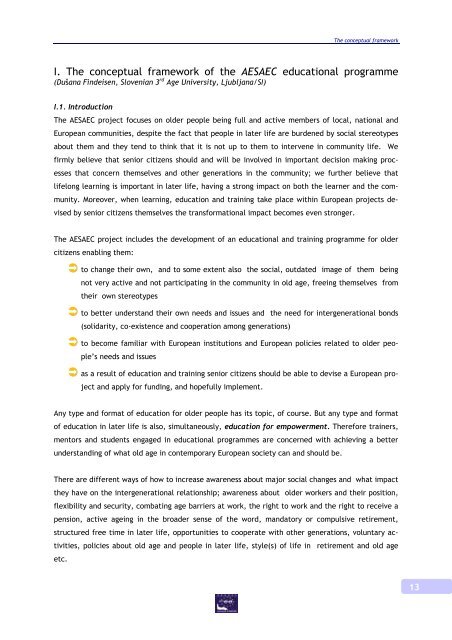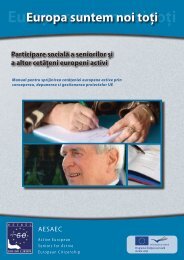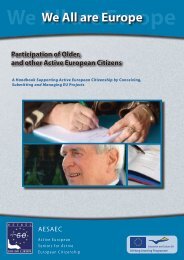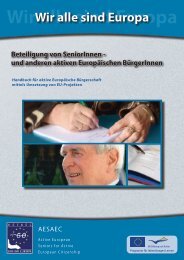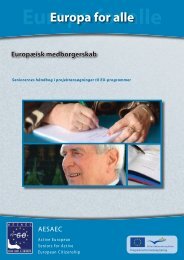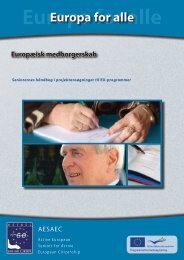We All are Europe - AESAEC
We All are Europe - AESAEC
We All are Europe - AESAEC
You also want an ePaper? Increase the reach of your titles
YUMPU automatically turns print PDFs into web optimized ePapers that Google loves.
The conceptual framework<br />
I. The conceptual framework of the <strong>AESAEC</strong> educational programme<br />
(Dušana Findeisen, Slovenian 3 rd Age University, Ljubljana/SI)<br />
I.1. Introduction<br />
The <strong>AESAEC</strong> project focuses on older people being full and active members of local, national and<br />
<strong>Europe</strong>an communities, despite the fact that people in later life <strong>are</strong> burdened by social stereotypes<br />
about them and they tend to think that it is not up to them to intervene in community life. <strong>We</strong><br />
firmly believe that senior citizens should and will be involved in important decision making processes<br />
that concern themselves and other generations in the community; we further believe that<br />
lifelong learning is important in later life, having a strong impact on both the learner and the community.<br />
Moreover, when learning, education and training take place within <strong>Europe</strong>an projects devised<br />
by senior citizens themselves the transformational impact becomes even stronger.<br />
The <strong>AESAEC</strong> project includes the development of an educational and training programme for older<br />
citizens enabling them:<br />
to change their own, and to some extent also the social, outdated image of them being<br />
not very active and not participating in the community in old age, freeing themselves from<br />
their own stereotypes<br />
to better understand their own needs and issues and the need for intergenerational bonds<br />
(solidarity, co-existence and cooperation among generations)<br />
to become familiar with <strong>Europe</strong>an institutions and <strong>Europe</strong>an policies related to older people’s<br />
needs and issues<br />
as a result of education and training senior citizens should be able to devise a <strong>Europe</strong>an project<br />
and apply for funding, and hopefully implement.<br />
Any type and format of education for older people has its topic, of course. But any type and format<br />
of education in later life is also, simultaneously, education for empowerment. Therefore trainers,<br />
mentors and students engaged in educational programmes <strong>are</strong> concerned with achieving a better<br />
understanding of what old age in contemporary <strong>Europe</strong>an society can and should be.<br />
There <strong>are</strong> different ways of how to increase aw<strong>are</strong>ness about major social changes and what impact<br />
they have on the intergenerational relationship; aw<strong>are</strong>ness about older workers and their position,<br />
flexibility and security, combating age barriers at work, the right to work and the right to receive a<br />
pension, active ageing in the broader sense of the word, mandatory or compulsive retirement,<br />
structured free time in later life, opportunities to cooperate with other generations, voluntary activities,<br />
policies about old age and people in later life, style(s) of life in retirement and old age<br />
etc.<br />
13


